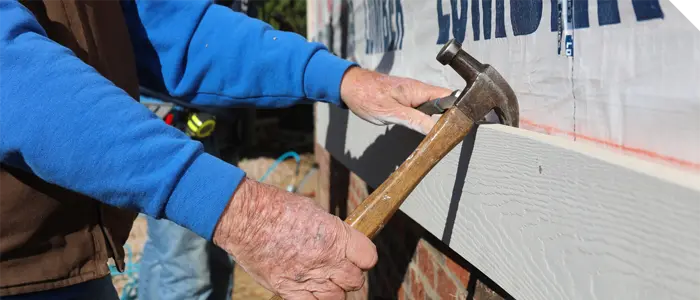Mount Pleasant Food Ministry: Feeding Hope
By Cindy Stone and Avalin Inman

In a small town like Mount Pleasant, community isn’t just a word—it’s a way of life. Over the past two decades, one local organization has embodied that spirit of compassion and service: Mount Pleasant Food Ministry. This year, the ministry celebrates an extraordinary milestone—20 years of feeding families, supporting neighbors, and being a cornerstone of hope for the eastern side of Cabarrus County.
Founded in 2005, the Mount Pleasant Food Ministry began as a vision shared by a handful of caring individuals who recognized a pressing need in their hometown. With no local food pantry or clothing closet available at the time, a group of women in the community—including the wife of founder Harry Lassiter—sparked the idea for what would become a vital support system for families facing food insecurity.
Harry Lassiter, who had been preparing for retirement after a long career in education, saw the food ministry as a natural next step. After consulting with Cooperative Christian Ministry (CCM) in Concord for guidance, Harry presented the idea to the men’s brotherhood groups of six local churches. He asked for a board member and a modest donation from each congregation. The response was immediate—and the first seeds of the Mount Pleasant Food Ministry were planted.
Today, the organization stands as a testament to what can happen when neighbors come together to take care of each other.
Meeting Needs with Compassion
From its humble beginnings, Mount Pleasant Food Ministry has grown steadily, now serving about 110 families—and approximately 30 individuals—each month. Over the years, the numbers have fluctuated, sometimes climbing higher, but the commitment to helping every individual who walks through their doors has remained steadfast.
One of the hallmarks that sets Mount Pleasant Food Ministry apart is its personal approach. Every family that comes in for assistance is treated with dignity and respect. Volunteers work directly with families to learn about their food preferences, noting dislikes and special requests. This thoughtful practice minimizes waste and ensures that each bag of groceries contains food items that families will actually use.
As David Lassiter, Vice President of the Mount Pleasant Food Ministry’s board of directors, explains, “We keep cards of their likes and dislikes so we can target certain donations for their bags in the future.” This extra step makes a meaningful difference, showing recipients that they are seen, heard, and valued.
Built on Volunteer Power
Astonishingly, the Mount Pleasant Food Ministry has operated entirely on volunteer power for its entire 20-year history. No one has ever drawn a paycheck, and a dedicated army of volunteers keeps the ministry running like clockwork.
Volunteers pick up donations from local Food Lion and Harris Teeter stores, staff the food distribution days, run errands to Second Harvest Food Bank, and even make daily stops to collect fresh produce. Their passion and commitment ensure that the pantry shelves stay stocked and that families have access to healthy options throughout the year.
As David proudly shares, “We’ve got volunteers everywhere—and the volunteers at times rotate.” Whether it’s picking up groceries, sorting donations, or assembling food bags for special programs like the PB & J Summer Ministry, the community’s helping hands are the backbone of the operation.
A Culture of Generosity
Mount Pleasant’s generosity shines through not just in volunteerism but also in financial and food donations. Harry recalls times when help arrived just when it was most needed—like the woman who, after receiving assistance herself, returned with a $4,000 check, or the Duke Endowment grant that delivered $90,000 over several years to bolster the ministry’s mission.
The food ministry receives critical support through community food drives, like the “Scouting for Hunger” campaign hosted by local Scouts, school-led competitions, and even beauty pageant organizations. Whether it’s collecting peanut butter for summer lunches or hosting Thanksgiving turkey drives, these collaborations ensure the pantry is well-stocked.
A notable example is a local couple who, beginning in 2020, began delivering groceries every Tuesday based on a list provided by the ministry. Their ongoing support, made possible by an inheritance from their grandparents, has had a huge impact.
Social media, too, has become a vital tool for the ministry. When there’s a need—whether it’s food, grocery bags, or volunteers—a simple post on Facebook often leads to an outpouring of community support.
Seasonal Support for Children and Families
Understanding the unique needs of children during the summer months, Mount Pleasant Food Ministry participates in the PB & J Summer Ministry, in collaboration with the Sonshine Backpack Ministry. During the 12-week summer program, the food ministry provides kid-friendly foods that children can prepare independently.
Each family receives three numbered paper bags, one for each week, ensuring they have nutritious meals even when school cafeterias are closed. Last summer, the program served about 35 children—an effort made possible by careful planning, strategic partnerships, and, once again, the unwavering dedication of volunteers.
How Families Can Receive Help
Accessing support from Mount Pleasant Food Ministry is designed to be as simple and welcoming as possible. Families in need can show up during open hours—no appointment necessary—bringing an ID and proof of residency, such as a utility bill. Even if someone lives outside the immediate area, the ministry will provide food assistance at least once to help them in the moment of need.
Relationships with school social workers and other community advocates also help identify families who may benefit from the ministry’s services. This proactive approach ensures that no one falls through the cracks.
Looking Toward the Future
As Mount Pleasant and the surrounding areas continue to grow, the food ministry is mindful of the challenges that population growth can bring. Rising living costs and a shortage of affordable housing could increase demand for food assistance in the coming years.
Yet, Harry and David remain optimistic. Their recipe for success—strong finances, good volunteers, and unwavering community support—has carried them through the past 20 years and will, they believe, sustain them for many more.
Their “20 for 20” fundraising campaign, launched in celebration of their anniversary year, aims to cultivate more small donors to ensure the food ministry’s future stability. It’s another example of how Mount Pleasant Food Ministry continues to adapt and grow while remaining true to its founding values.
Why Mount Pleasant—and Cabarrus County—Are Special
For Harry and David Lassiter, Mount Pleasant isn’t just where they live; it’s home. It’s a place where neighbors still step up when someone’s in need, and where relationships with churches, schools, businesses, and individuals form a powerful network of support.
As Harry puts it, “I guarantee you I’ve been here long enough that if a situation arises and I needed to raise $10,000, we’re raising that kind of money in a short period of time because of relationships.”
In a world that often feels increasingly disconnected, Mount Pleasant Food Ministry stands as a shining example of what can be achieved when a community pulls together with kindness, faith, and a shared commitment to helping others.
The Greater Cabarrus Foundation is proud to spotlight Mount Pleasant Food Ministry—an organization that perfectly captures what makes Cabarrus County great.
Related Posts

The Vision Behind Cooperative Christian Ministry’s Rebuilders Campus
The Rebuilders Campus is constructing a future filled with opportunity, hope, and stability for individuals and families facing homelessness.

Cabarrus Arts Council: Building Community Through the Arts
Cabarrus County is a place where creativity thrives, and at the heart of its artistic community is the Cabarrus Arts Council. Leading the charge in fostering the county’s vibrant arts scene is Liz Fitzgerald, Executive Director of the Cabarrus Arts Council.

Habitat Cabarrus: The Ripple Effect of Affordable Homeownership
Since its founding in 1986, Habitat for Humanity of Cabarrus County has been dedicated to providing safe, decent, and affordable housing to families in need. However, the organization does far more than construct homes—it builds communities, strengthens families, and offers a path to stability and self-reliance.


